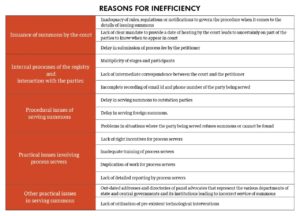Manali Chotalia & Khushi Lunawat
The definition of the term ‘summons’ has not been provided under any statute, but in simple terms, it means an instrument that is issued by a court to any person to be present before it in legal proceedings.
When a suit has been filed against a person (criminal or civil), a summon is issued by the court to such person requiring him to be present before it on the given time and date for the hearing. Summons are sent to make sure that the opposite party knows and is informed about the hearing and presents himself, thereby explaining the circumstances per his knowledge and information.
When an individual receives a summon, it becomes obligatory on his part to show before the court, if the person doesn’t appear at the stipulated time and place, then it’ll be Contempt of Court and such person shall be punished.
Under what cases summons are issued?
Summons are issued under Criminal cases and Civil cases for which provisions have been provided under Code of Criminal Procedure, 1973 and Code of Civil Procedure, 1908 respectively.
Provisions u/s 61 to 69 of Chapter VI of Code of Criminal Procedure, 1973 deals with forms and modes of summons.
Section 61 states that the summons to be issued should be in writing and the a copy of it signed by the presiding officer of that court or by other such officer on the rule directed by the High Court should be sent to the person concerned and the summon should bear the seal of the court.
Modes for services of summons are as follows –
- Section 62 states how the summons are served:
(1) “Every summons shall be served by a police officer, or subject to such rules as the state government may make in this behalf, by an officer of the court issuing it or other public servant.
(2) The summons shall, if practicable, be served personally on the person summoned, by delivering or tendering to him one of the summons.
(3) Every person on whom the summons is so served shall, if so required by the serving officer, sign a receipt therefor on the back of the other a copy.”
- Service of summons on corporate bodies and societies (Section 63):
When summons are to be sent to any corporation, it will come into effect by serving summons to the secretary, local manager or other principal officer of the concerned corporation. It can also be sent by post to the chief officer of that corporation. When sent through registered post, it shall come to effect when the letter will arrive in the ordinary course of post.
- Service when person summoned cannot be found (Section 64):
In case when a person summoned is missing or cannot be found even after due diligence, then the summon would be served by giving a a copy of it to the adult male member of his family residing with him and the person with whom the summon is left may be required to sign a receipt on the back of other a copy. Here, it also has been stated that a servant is not a member of the family.
- Procedure when service cannot be effected as before provided (Section 65):
When a summon cannot be provided as per Section 62, 63 or 64 after exercise of due diligence, then a copy of it shall be affixed by the serving officer on the apparent house where the person resides. The court may, after making the necessary inquiries declare that the summons have been served or can order fresh service of the same.
Karnataka High court in Mac Charles (I) Ltd v Chandrashekar & Anr. had stated that this mode is ‘substituted service’. This mode can only be used when the above mentioned modes are exhausted.
- Service on Government servant (Section 66):
When the person summoned is in the active service of the government, the court shall issue the summon and its copy to the head of the office where the person is employed and that head shall give it to the person as per Section 62 and shall return the a copy to the court along with the signature.
Such signature shall be evidence of due service.
- Service of summons outside local limits (Section 67):
When the court desires that the summons should be issued at any place outside its local jurisdiction, then it shall send a copy to the Magistrate within whose jurisdiction the person summoned resides.
- Proof of service in such cases and where serving officer not present (Section 68):
In case a summon is issued outside the local jurisdiction of the court, then the serving officer should be present in hearing of that case, if the serving officer is absent, an affidavit made before the Magistrate shall be produced and a copy of the summon purporting to be endorsed by the person with whom it was left would be an admissible evidence.
The affidavit may be attached to the summons and returned to the court.
- Service of summons on witness by post (Section 69):
A court while issuing a summons to a witness, can with the issue of the summons, direct a copy of the summons to be served by registered post to the witness at the place of his residence or where such person carries a business or personally works for gain.
Were an acknowledgement has been made by the postal employee that the witness has refused to take delivery of the summons, then the court may declare that the summons has been duly served.
Modes of service of summons under Civil Procedure Code, 1908 are as follows –
Order V of CPC contains Rules 1-30, where Rules 1-8 seals with issue of summons and Rules 9-30 with service of summons.
- Summons to Defendants (Section 27):
Here, the defendant is sent a summon obliging him to be present before the court on the prescribed day and date for the hearing.
- Service of summons where Defendant resides in another state (Section 28):
When a summons is sent to another state court for service, it is done in such manner as may be prescribed by rules in force in that state.
The court on receiving the summons shall send a receipt of the proceeds and shall return the summons to the court of issue along with the record of the proceedings.
- Services of foreign summons are dealt in Section 29
- Power to order discovery and the like in Section 30
where the court can issue summons to persons whose attendance is required to give evidence or any other document or object.
- Penalty for default is dealt in Section 32
Order 5 Rules 9-20 –
- Service by court:
Under Rule 9 the summons to be sent to the person residing within the jurisdiction of the court shall be delivered or sent through registered courier service. The acknowledgement or receipt shall be signed by the defendant or if the delivery is denied by the defendant it shall be declared by the court as due service.
- Service by plaintiff:
Under Rule 9A, the court on the application by the plaintiff allow the plaintiff to affect the service of summons upon defendant. If such summon is refused then the court can again issue the same.
- Service of agents:
Rule 13 states that summons are served on the manager or any person carrying out the business of such person to whom the summons is issued, if that person resides outside the jurisdiction of court.
- Service on adult member of family:
Rule 15 states that when a person cannot be found or is absent, then the summons can be given to any adult member of his family.
- Service when defendant refuses to accept service:
When a defendant refuses to accept the service, then the serving officer can affix the copy of summons on the apparent house part where the defendant resides, as per Rule 17.
- Substituted service:
As per Rule 20, when a defendant refuses to accept the summons, then the court can affix the summons on a part of the house where he resides or in his place of business. The court can also advertise in a newspaper in the locality where the person had last resided, the order service.
The court employs various modes through which it can ensure that the summons reach the defendant or the person concerned.
Contents of Summon
- Summons shall always be in writing
- It shall be in a copy
- It shall be signed by the presiding officer of the court
- It shall also bear the seal of the court
- Full name and description of the person summoned.
- The name of the authority by which summoned proposed to be served.
- Time, place and date.
Vidhi Centre for Legal Policy Report
“Indian Courts spend 273 days serving a summon, tech can speed this up”
According to a report by Justice, Access & Lowering Delays in India (JALDI) initiative at Vidhi Centre for Legal Policy. It has highlighted certain roadblocks in the searching of summons and called for called for expediting and streamlining the process through Information and Communication Technology (ICT) integration.
Analysis of that report
Causes for delay in summons:
“In the event that the party being served (or her agents) simply choose not to accept summons or sign the acknowledgement, reserving of summons becomes another futile exercise and only adds to the amount of judicial time that has to be spent. In such cases, to procedurally conclude the service process, a copy of the summons has to be prominently affixed on the house/office and then, ideally, also be published in a widely circulated newspaper, report stated”

Judicial recognition of Summons through email or other messaging apps:
In response to a summons by e-mail and WhatsApp, the report noted that, in 2010, the Supreme Court in, Central Electricity Regulatory Commission v National Hydroelectric Power Corporation Ltd, had allowed an e-mail notification to be sent along with the ordinary mode of operation.
The Court also held that this practice should be observed in commercial disputes and in cases where immediate interim relief is requested by the Supreme Court.
In addition, courts such as Bombay and Delhi High Courts have also begun to recognise the value of services such as WhatsApp for service of court notice, according to the report.
However, although these approaches suggest a transition towards electronic methods of serving a summons, the study argued that, in such situations, it is difficult to obtain sufficient proof of service delivery.
Different methods for information collection
As one of the main causes of delays at the summons stage is the lack of sufficient details on the group being served, a few recommendations were made in the study to correct this:
Collaborate with other government departments to access databases: Each High Court, in collaboration with other government departments, can create an application that allows access to their independent contact information databases.
Request for information from the public by subscription: Another way for the High Court to collect information is to request it from the public through a subscription model. High Courts can allow individuals to subscribe to their website to receive e-Summons issued against their name.
Register of panel advocates: State governments and central government agencies have panel advocates at each High Court. In cooperation with the Central Agency, the Registry of the High Court can maintain a regularly updated register of contact information for such persons.

